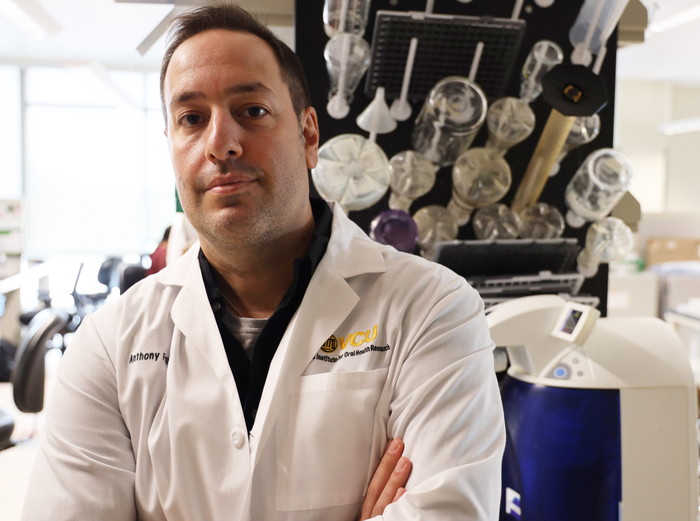New research from VCU Massey Cancer Center — published Thursday in Cell Reports — demonstrated that a novel targeted therapy could be an effective treatment option for a deadly pediatric cancer known as neuroblastoma.

Credit: Blake Belden, VCU Massey Cancer Center
New research from VCU Massey Cancer Center — published Thursday in Cell Reports — demonstrated that a novel targeted therapy could be an effective treatment option for a deadly pediatric cancer known as neuroblastoma.
Neuroblastoma is a type of cancer that develops in nerve tissue, most commonly in the glands around the kidneys. Despite multiple medical advancements that have improved outcomes for the disease, high-risk neuroblastoma remains responsible for the most cancer-related deaths in children five years and younger.
Previous research has demonstrated that the activation of a specific group of proteins — MEK/ERK — helps neuroblastoma cells survive and grow. However, a class of drugs used to prohibit the function of these proteins called MEK inhibitors have proven ineffective in treating the disease because high doses are associated with a substantial level of toxicity.
“Breakthroughs significantly altering the fate of high-risk neuroblastomas have been elusive,” said study author Anthony Faber, Ph.D., co-leader of the Developmental Therapeutics research program and Natalie N. and John R. Congdon, Sr. Endowed Chair in Cancer Research at VCU Massey Cancer Center.
To address the lack of effective treatment options for neuroblastoma, Faber’s laboratory along with his collaborators performed high-throughput drug screening with SHP099. This compound belongs to a new class of drugs that target and block an enzyme called SHP2, which is along the same genetic pathway as MEK/ERK.
High-throughput screening is an important method in drug discovery and design that allows researchers to automate thousands to millions of tests on chemical or biological compounds.
Repeatedly, Faber and his research team found that neuroblastoma tumors in mice were sensitive to SHP099, and the tumors shrank considerably in some of the models. SHP099 had a particularly effective impact in tumor cells that had limited or no expression of the neurofibromin 1 (NF1) protein. Additionally, they determined that NF1 expression is much lower in advanced or relapsed neuroblastoma cells, and the protein is more readily deactivated in high-risk neuroblastoma.
“We found variable yet consistently positive effects across all models of low NF1, high-risk neuroblastoma, revealing a new drug target in relapsed disease,” said Faber, who is also an associate professor in the Philips Institute for Oral Health Research at the VCU School of Dentistry.
Faber said one of the most important findings in the study — made by first authors Jinyang Cai, Ph.D., and Sheeba Jacob, Ph.D., — was that SHP2 inhibitors were ineffective at blocking the function of MEK/ERK in healthy cells and therefore were not toxic to them.
“These findings suggest that, unlike MEK inhibitors, SHP2 inhibitors may be dosed high enough to inhibit MEK/ERK signaling in neuroblastoma tumors,” said Faber, who credited the high efficiency and capabilities of the Cancer Mouse Models Core at Massey for allowing his team to comprehensively test SHP099.
As there are a large number of SHP2 inhibitors now in clinical testing, Faber will work with collaborator John Glod, M.D., Ph.D., to hopefully bring one of these inhibitors into clinical testing at the National Cancer Institute. Currently, Faber’s group is also planning to test SHP2 inhibitors in combination with anti-GD2 therapy, an approved immunotherapy for neuroblastoma.
In addition to neuroblastoma, Faber’s team also found SHP099 to be effective in head and neck squamous cell carcinoma (HNSCC). Separate findings will be published soon, and the team is planning further testing of a combination therapy in HNSCC with SHP2 and EGFR inhibitors.
Members of Faber’s laboratory included Jinyang Cai, Ph.D., Colin Coon, Sheeba Jacob, Ph.D., Richard Kurupi, Ph.D., and Krista Powell, M.S., of the Philips Institute for Oral Health Research at the VCU School of Dentistry. Faber also collaborated on this study with Mikhail Dozmorov, Ph.D., member of the Cancer Biology research program at VCU Massey Cancer Center; Cyril Benes, Ph.D., Regina Egan, Patricia Greninger, Joseph McClanaghan, Ellen Murchie and Giovanna Stein of Harvard Medical School; Yuta Adachi, Hiromichi Ebi, M.D., Ph.D., and Kentaro Hirade of Aichi Cancer Center Research Institute; John Glod, M.D., Ph.D., of the National Cancer Institute; Sosipatros Boikos, M.D., formerly of the VCU School of Medicine and now at Georgetown University Medical Center; and Giordano Caponigro and Huaixiang Hao, Ph.D., of Novartis Institute of Biological Research.
Journal
Cell Reports
DOI
10.1016/j.celrep.2022.111095
Method of Research
Experimental study
Subject of Research
Animals
Article Title
High-risk neuroblastoma with NF1 loss of function is targetable using SHP2 inhibition
Article Publication Date
28-Jul-2022
COI Statement
C.H.B. is an employee of Novartis and previously received funding from Novartis. A.C.F. is a current scientific advisor for Treeline Biosciences and was a past scientific advisor for AbbVie.




